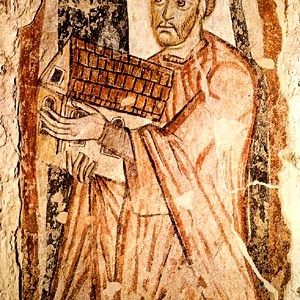However severe God’s guidance may seem to us at times, it’s always the guidance of a Father who is infinitely good, wise and kind. He leads us to our goal by different paths.
— St. Julie Billiart
Disconcerting Circumstances
With ourselves and in our families, our workplaces, and even our parishes, we all face struggles that come with being part of the human family. The unsavory circumstances we find ourselves in might be the result of our own sins or of our association with someone else (often a relative) and of which we are completely blameless.
It’s tempting to let these situations derail us from our mission — especially if they are embarrassing, stain our reputation, or make us feel contaminated. But in such cases, it is important to persevere in the spiritual life. God has a plan.
Saint Helena during the Roman Persecution
As a young woman, Helena looked forward to a promising future. She was the wife of Governor Constantius Chlorus. Together they had a son named Constantine. Constantius Chlorus was a military tribune in one of Rome’s smaller provinces, but he was ambitious, and when the opportunity presented itself, he cast Helena off to marry the stepdaughter of Maximian, the Western Augustus. This was no doubt a political move, as it resulted in his appointment as Maximian’s Caesar.
It
is likely that during this time Helena became a Christian. Rome was a dangerous
place for a Christian to live. Labeled the scapegoat for Roman misfortunes,
plagues, and financial woes, Christians suffered barbaric cruelties. If members
of the minority Faith were found practicing their beliefs, they might be fed to
starved wild animals as entertainment for the masses, or their bodies might be
used as human torches to light the famous Appian Way.

The late third century and
the early fourth century, during Helena’s middle years, produced the worst of Christian
persecutions under the Roman emperors Galerius and Diocletian. Public
sacrifices to the imperial cult were mandatory. If Christians refused, they
paid with their lives, often in the most excruciating and painful ways
imaginable.
The Victory of the Cross
The Roman Empire was a divided kingdom governed by co-emperors, one of whom was Constantius Chlorus, who ruled the Western Kingdom. Upon his father’s death, Constantine was proclaimed emperor of the West. His plan was to unify the empire under his reign. The first step was to take Rome and with it the Eastern Empire, ruled by Maxentius, but Constantine was greatly outmatched by Maxentius’s forces.
On the eve of what was his most decisive engagement at the Milvian
Bridge, Constantine was encamped with his men. Here the city of Rome, and with
it the rule of the Eastern Empire, would be won or lost. Suddenly an unearthly
sign appeared in the sky: a cross and on it the first two Greek letters of
Christ’s name, the Chi-Rho.
Seeing the sign, perhaps Constantine thought of
his Christian mother, Helena. He must have recognized her teaching about
Christianity in the image. Could there be something
to that belief of hers? That night, Constantine had a dream in which Jesus Christ
instructed him to put the Christian symbol on the helmets and shields of his
soldiers. Without hesitation Constantine declared the Chi-Rho his new battle standard.
At
the Milvian Bridge, Constantine drove Maxentius and his men into the Tiber
River, where Maxentius, weighed down by his armor, drowned.
A New Era
As the new emperor, Constantine did what his citizens must have thought madness: he gave Christianity the full protection of Roman law. The mighty Roman Empire — Christian? It was inconceivable to any early-fourth-century Roman citizen. And yet a new era was dawning: not only was Christianity legal, but the emperor’s mother was also a professed believer. Constantine had declared his mother “Augusta”; Helena was thereby venerated as empress and enjoyed a share of influence in Roman government, which she no doubt used for the propagation of her Christian Faith.
A
Crisis for Helena
Constantine
had four sons. Like his father, he put his first wife aside to marry a younger
woman, Fausta. Through this union, three sons were born. But Constantine’s
eldest son, from his first marriage, Crispus, demonstrated the same military
talent and leadership qualities as his father. Crispus was well loved by all,
especially by his grandmother Helena. So it was surprising that Constantine
one day had Crispus thrown into prison. Shortly afterward, and without a trial,
he ordered the execution of Crispus.
Why this sudden and outrageous behavior? There are different stories about Fausta and Crispus. The most accepted explanation is that Fausta, rightly or wrongly, accused Crispus of raping her or doing something equally horrific.
Some historians assume that Helena pleaded Crispus’s innocence to Constantine. Could it be that Fausta wanted Crispus dead so her own sons would have primacy in the empire? How could Fausta’s sons ascend to power if Crispus was in the way? In any case, Constantine promptly rescinded his deadly order, but it was too late. Crispus had already been executed in his prison cell.
His next move was to deal with Fausta. Constantine ordered his wife’s execution. She was put in a bath that was heated until she was dead. By imperial decree, Crispus’s and Fausta’s names were removed from all histories and public records — as if these two people had never existed and these horrible events had never happened. Even to speak their names was strictly prohibited.
Given human nature, we can imagine that people must have shared
the tantalizing information all the more, simply because it was forbidden. The news must have buzzed throughout the empire.
On a personal level, Helena’s heart must
have been broken. Not only did she lose her beloved grandson, but she also saw
her only son commit murder twice, putting his soul in mortal danger. However,
there was something else to consider, something more weighty for Helena to
grieve over — the potential loss of Roman souls. The ruling family was in a
particularly influential position regarding the propagation of the Faith, and this was their example. The
elderly Helena did the only reasonable thing she could do — she sought the will
of God.
The True Cross
Helena realized
that if Christianity were to flourish, the people would need something
substantial to rally behind. Indeed, the most significant relic in all of early
Christendom — the True Cross of Christ — would certainly unite the people of
the expansive Roman Empire through their common faith in Jesus Christ and
fidelity to His Church. And so, with the full backing of Emperor Constantine,
she set out on a royal pilgrimage to the Holy Land in search of the True
Cross. This grand undertaking would two to four years to complete and would
consume the last few years of the elderly Helena’s life. She was in her late
seventies, possibly in her early eighties — absolutely ancient for that era.
We know from Eusebius of Caesarea, a Roman bishop, historian,
and theologian who died about A.D. 340, that the powerful Empress Helena
Augusta was generous. He writes about Helena’s pilgrimage to the Holy Land:
Especially abundant were the gifts she bestowed upon the naked and unprotected poor. To some she gave money, to others an ample supply of clothing; she liberated some from imprisonment, or from the bitter servitude of the mines; others she delivered from unjust oppression, and others again, she restored from exile.
Using the credible writings of Eusebius about
the location of our Lord’s Crucifixion in conjunction with the oral traditions
maintained by the faithful, Helena located Golgotha. The holy relic, the true
Cross of Christ, was recovered. Portions of it were dispatched throughout the
Roman Empire, but the majority of it remained in the Holy City of Jerusalem.
Helena traveled back to Rome in time to die; her son Constantine
was at her bedside.
Who would have imagined things would turn
out the way they did? Helena, born a commoner, ended up becoming
the most powerful woman in the world. It was through her less-than-ideal
motherhood that she became Empress Helena Augusta. She had been a Christian
during the great persecution, only to be later instrumental in Christianizing
the entire Roman Empire. And, as a very old woman enduring the worst kind of
personal tragedy and public humiliation, she suffered a blow that would have
left most people broken and bitter. Saint Helena responded to the situation by
turning to the Lord and embracing her unique mission.
Sometimes the dysfunctional aspects of our lives, whether our own past or the behaviors of our close family members or associates, derail us from carrying out the mission God has for us. Saint Helena demonstrates that at every stage of life — no matter what our past, what happens, or how private or public the circumstances — the best course of action is to seek God’s will and do it anyway.
✠
This article is adapted from a chapter in Discover Your Next Mission from God: Saints who found God’s will — and how you can too. It is available from your local bookstore and online through Sophia Institute Press.












